TCM Diagnosis of Premenstrual Syndrome (PMS)
Premenstrual syndrome (PMS) is a diagnosis of Western Medicine, although Traditional Chinese Medicine (TCM) uses this name, but its methods on diagnosis and treatment are different.
1. Mood Swings
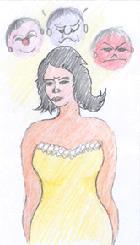
Individuals present with absent-mindedness, restlessness, sadness, insomnia, listlessness, a dull facial color, forgetfulness, palpitations, fatigue, reluctant to speak. There may also have delayed periods with scanty and thin menses flow. On examination, the tongue is pale; the pulse is thready.
Individuals present with irritability, restlessness, dizziness, stuffiness in the chest and rib sides, poor appetite, throat dryness, a bitter taste in the mouth, and even early periods with heavy and dark red menses flow. On examination, the tongue is red with yellowish fur; the pulse is taut and rapid.
Individuals present with anxiety, restlessness, incoherent speech, headache, insomnia, chest oppression, poor appetite and constipation. On examination, the tongue is red with yellowish thick greasy fur; the pulse is rolling, rapid and forceful.
2. Breast Tenderness
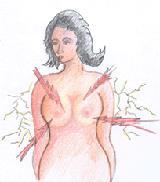
Individuals present with itchy and pain nipples, or distending pain in the breasts, the pain is worse when touched or pressed, and may find lumps or nodules too. There are also irritability, a tendency to sigh, stuffiness in the chest and rib sides, distending pain in the lower abdomen, non-smooth menses flow that is dark red color or clotted. On examination, the tongue is dark red color and coated by thin white fur; the pulse is taut.
Individuals present with itchy painful nipples, or distending pain in the breasts; in severe cases, the pain is so unbearable that can’t be covered clothing. Other accompanied symptoms include chest tightness, poor appetite, excess throat discharges, excessive sticky vaginal discharges, and scanty thin menses. On examination, the tongue is bulky and pale with greasy and white fur; the pulse is slow and rolling.
3. Headache

Individuals present with dull headache, dizziness, paleness, heart palpitations, insomnia, mental fatigue and general weakness. Individuals may have scanty and light menses. On examination, the tongue is pale and coated with white thin fur; the pulse is thready.
Individuals present with distending pain in the forehead, even may have dragging pain on the head crown sometimes. They also experienced dizziness, irritability, throat dryness, and a bitter taste in the mouth; menses flow is scanty and is bright red in color. On examination, the tongue is red with yellow fur; the pulse is taut or thready and taut.
Individuals present with severe headache, stabbing or throbbing pain fixed in one location. There may have pain in the lower abdomen that is worse when pressed; non-smooth menses flow that is scanty and dark purple or clotted. On examination, the tongue is dark red and may have purple spots; the pulse is thready and hesitant, or taut and hesitant.
Individuals present with distending pain or heaviness in the head, dizziness, obesity, poor appetite, nausea, chest and abdominal distention, general weakness, drowsiness, and frequent belching. Individuals may also have excessive sticky vaginal discharges and the menses are light and scanty. On examination, the tongue is bulky and pale with white greasy fur; the pulse is rolling.
4. Puffiness
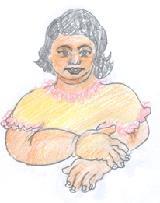
Individuals present with puffy face and limbs, gastric distention, poor appetite, loose stools, bloating, mental fatigue, limb heaviness, scanty urine, or the presence of excessive light menses. On examination, the tongue is pale and covered by a white or greasy fur; the pulse is slow.
Individuals present with puffy face and limbs (in particular the lower limbs), dizziness, ear ringing, soreness in the lumbar and knee regions, cold feeling in lumbar and abdomen, poor appetite, and loose stools. Individuals may also have excessive thin menses. On examination, the tongue is pale and bulky, and the coating is white and glossy; the pulse is deep and weak.
Individuals present with general puffiness, gastric and rib cage distention, or distending pain in the lower abdomen. Some individuals may have non-smooth and scanty menses flow that is dark red or clotted. On examination, the tongue is pale and covered by thin white fur; the pulse is taut and rolling.
5. Mouth Sores
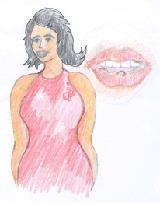
Individuals present with sores or painful ulcers in the oral cavity, dryness in the mouth and throat, vexing heat in the chest, palms and soles, a thin physique, disturbed sleep, scanty and yellowish urine. On examination, the tongue is red particularly on the tip and is covered by a thin yellowish fur; the pulse is thready and rapid.
Individuals present with painful oral ulcers on the tongue or in the oral cavity, hot bad breath, thirst with preference for cold drinks, good appetite, constipation and yellowish urine. On examination, the tongue is red and covered by a thick yellow fur; the pulse is rolling and rapid.
6. Hives (nettle rash / urticaria)
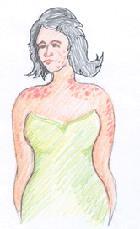
Lumpy skin rashes that are pale color, very itchy and worse at night. Other usual symptoms include skin dryness, a lusterless and pale complexion, restlessness, and poor sleep. There may have delayed periods, and the menses are scant and light red. On examination, the tongue is pale; the pulse is thready.
Red raised rashes that are very itchy and worse with warm temperatures. Other usual symptoms include mouth dryness, thirst, constipation and yellowish urine. On examination, the tongue is red with yellowish fur; the pulse is floating and rapid.


